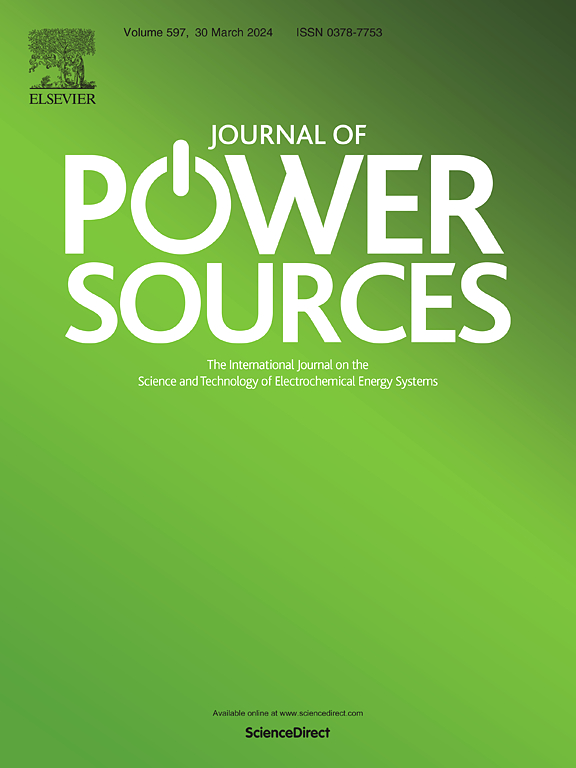Optimized multi-stage constant current fast charging protocol suppressing lithium plating for lithium-ion batteries using reduced order electrochemical-thermal-life model
IF 8.1
2区 工程技术
Q1 CHEMISTRY, PHYSICAL
引用次数: 0
Abstract
Multi-stage Constant Current (MCC) is a state-of-the-art fast-charging protocol considering battery aging. It divides the charging process into multiple stages, each with a different current amplitude based on specific transition criteria, significantly influencing battery performance, such as charging time, degradation rate, and thermal effects. A key challenge in designing MCC protocols is addressing the lithium plating (LiP), which can accelerate degradation and pose a severe risk of thermal runaway. Since the LiP onset conditions vary between fresh and aged cells, this paper proposes an optimized MCC (O-MCC) charging protocol suppressing LiP based on the battery's state of health. To accurately simulate LiP conditions, different platforms of reduced-order electrochemical-thermal-life models are designed, compared, and optimized for speed and accuracy using a genetic algorithm, resulting in a 36.4 % reduction in computational time while maintaining the accuracy of the Pseudo Two-Dimensional model. The Nonlinear Model Predictive Control algorithm is then used to optimize the MCC protocol, minimizing charging time while preventing LiP throughout life. Experimental results show that O-MCC reduces charging time by 11.7 % and capacity loss by 59.4 %, enhancing battery safety. Additionally, O-MCCs with varying constraints are developed to meet specific demands and simulated at the battery pack level.
利用还原阶电化学-热寿命模型优化抑制锂离子电池镀锂的多级恒流快速充电协议
多阶段恒流(MCC)是一种考虑到电池老化的先进快速充电协议。它将充电过程分为多个阶段,每个阶段根据特定的过渡标准采用不同的电流振幅,从而显著影响电池性能,如充电时间、降解率和热效应。设计 MCC 协议的一个关键挑战是解决锂镀层(LiP)问题,因为锂镀层会加速降解并带来严重的热失控风险。由于新电池和老电池的锂镀层发生条件各不相同,本文提出了一种优化的 MCC(O-MCC)充电协议,可根据电池的健康状况抑制锂镀层。为了准确模拟锂电状态,本文设计了不同的降阶电化学-热寿命模型平台,对其进行了比较,并使用遗传算法对其速度和准确性进行了优化,从而在保持伪二维模型准确性的同时减少了 36.4% 的计算时间。然后使用非线性模型预测控制算法优化 MCC 协议,最大限度地缩短充电时间,同时在整个生命周期内防止锂电池氧化。实验结果表明,O-MCC 缩短了 11.7% 的充电时间,减少了 59.4% 的容量损失,提高了电池的安全性。此外,还开发了具有不同约束条件的 O-MCC 以满足特定需求,并在电池组层面进行了模拟。
本文章由计算机程序翻译,如有差异,请以英文原文为准。
求助全文
约1分钟内获得全文
求助全文
来源期刊

Journal of Power Sources
工程技术-电化学
CiteScore
16.40
自引率
6.50%
发文量
1249
审稿时长
36 days
期刊介绍:
The Journal of Power Sources is a publication catering to researchers and technologists interested in various aspects of the science, technology, and applications of electrochemical power sources. It covers original research and reviews on primary and secondary batteries, fuel cells, supercapacitors, and photo-electrochemical cells.
Topics considered include the research, development and applications of nanomaterials and novel componentry for these devices. Examples of applications of these electrochemical power sources include:
• Portable electronics
• Electric and Hybrid Electric Vehicles
• Uninterruptible Power Supply (UPS) systems
• Storage of renewable energy
• Satellites and deep space probes
• Boats and ships, drones and aircrafts
• Wearable energy storage systems
 求助内容:
求助内容: 应助结果提醒方式:
应助结果提醒方式:


